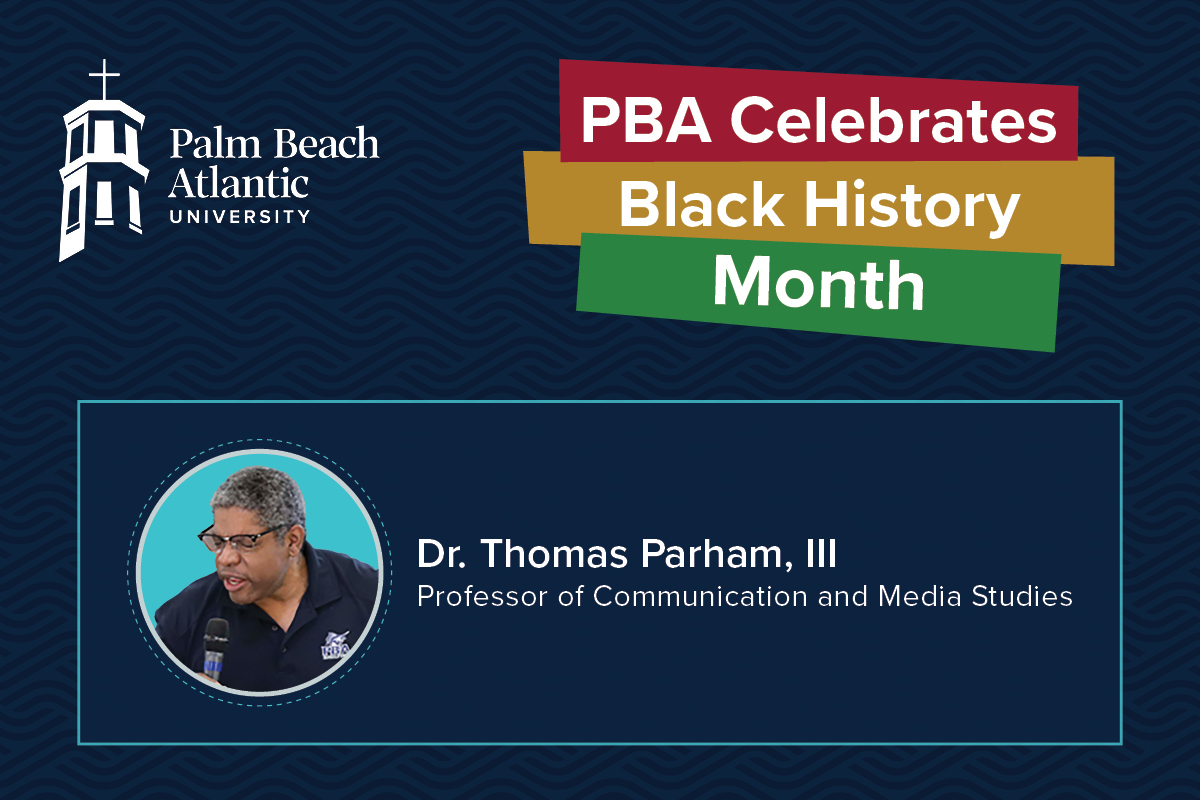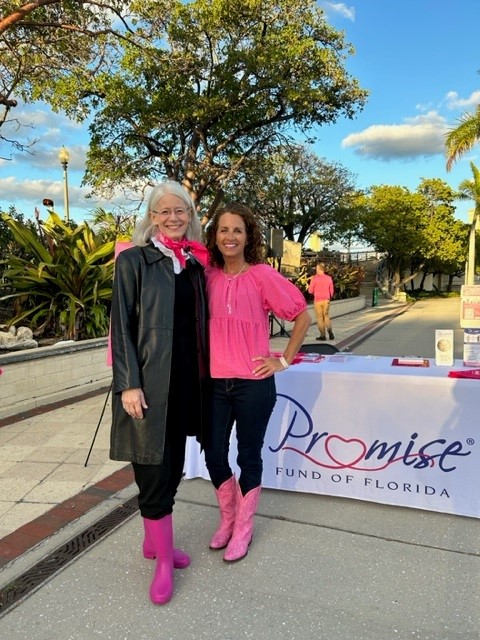February marks Black History Month, an annual celebration of the contributions and achievements of African Americans. We started the month by asking students to identify Black and African Americans who inspire them. One of those highlighted was Dr. Thomas Parham, III, Professor and Chair of the Department of Visual and Media Arts at PBA. We decided we could not close the month without spotlighting some of our exceptional employees who are charting their legacy as Black History heroes.
Dr. Thomas Parham, III’s resume shows experiences and knowledge that surpass many in his field. However, that’s not all that has earned students’ admiration — it is also his character, penchant for storytelling, and faith. Dr. Thomas Parham shared some of his journey, the influences that shaped him, and the legacy he continues to build.
Early Life, Military Service and the Discovery of his Calling
Born in Chicago, IL, Dr. Thomas Parham’s formative years were marked by frequent moves due to his father’s career as a Navy chaplain. Relocating to these various places across the United States gave him a broad cultural perspective that has become a hallmark of his character. His family lived in California, Rhode Island, northern Virginia, Maryland, and southeastern Virginia before he graduated high school. His educational path and career have been equally diverse. Dr. Thomas Parham earned a Bachelor of Science in English from the U.S. Naval Academy in Annapolis, which includes studies in both engineering and English courses.
After graduation in 1985, he stayed in Annapolis to teach Freshman English as a graduate assistant for one semester. He took courses at the University of Maryland before attending Navy training schools in San Diego.
Dr. Parham’s naval service took him to Japan, where he honed his interest in storytelling, cultivating video libraries for his ship and himself that sparked a lifelong passion for screenwriting. This interest led him to Regent University, where he earned a Master of Arts in Dramatic Communication and later a Ph.D. in Communication Studies. His doctoral thesis on “Star Trek: The Next Generation” helped lay the groundwork for a career in Hollywood, where he served as Supervisor of Publishing for Viacom Consumer Products.
The turn to academia came after experiences at Paramount Pictures, the set of “Touched by an Angel,” and CBS’s “JAG,” which gave him unique insights into script structure to understanding the importance of nurturing leadership. “After nearly a year at Paramount Pictures, I left the job in licensing to serve as the on-location writers’ assistant for the third season of “Touched by an Angel,” which shot in Salt Lake City,” Dr. Thomas Parham said. “The next year, I returned to Los Angeles and Paramount to work as the writers’ assistant and researcher on “JAG,” a CBS military legal drama. I sold a script produced toward the end of the third season and stayed with the show full-time until Biola University recruited me to teach Radio-Television-Film in their Communication department.”
Dr. Parham remained a script consultant with “JAG” until its eighth season. By that time, he was approached by Azusa Pacific University (APU) to help launch their cinema major. He spent 18 years at APU teaching classes in communication, film/television production, and screenwriting, initially for the Communication Studies department, then for Theater, Film & Television, and finally, Cinematic Arts, for which he was the founding department chair. He eventually took up the mantle at PBA, succeeding his friend and colleague, Dr. Alex Wainer.
Inspirations and Influences
Black History Month holds personal and professional significance for Dr. Parham. It’s a time to remember and celebrate the vast contributions of African Americans, including his own family’s notable history. From his uncle Dr. J.W.V. Cordice, Jr.— one of three surgeons who operated on Dr. King in Harlem Hospital after a deranged woman stabbed him in 1958, to his father’s pioneering Navy career, Dr. Parham’s heritage is interwoven with the rich tapestry of Black history. “My father was the biggest influence in my life,” he shared. “He instilled love of Jesus, education, music, and people within me. Daddy was the second Black chaplain in the Navy and the first African American promoted to the rank of Captain (O-6).”
He also cites the influence of educators like his ninth-grade English teacher, Wendy Mathias, and Naval Academy professors Dr. Nancy Wicker and Dr. John Wooten, who encouraged him to integrate faith and learning. This principle has guided his teaching philosophy. Among the leaders he admires, Dr. Parham lists Admiral Michelle Howard for her mentorship during his time at the Naval Academy and President Barack Obama for his integrity and leadership style.
Charting a Legacy at PBA
At PBA, Parham is charting his own legacy. He focuses on redemptive storytelling within the Screenwriting curriculum. He emphasizes the power of story and its ability to shape culture and foster understanding. “Associate Dean Antonio Zarro has been pleased with the improvement in student screenplays during my time at PBA. This accomplishment has been a team effort by the two of us and our talented pool of adjunct faculty,” shared Dr. Parham. True to his storytelling skills and personality, he added, “As the apostle John wrote, “In the beginning was the Word…”
He also shared that he has been blessed to have mentored some of the best—and most teachable—students he has encountered in 25 years of teaching, citing recent alumni like Bryanna Auel, Hunter Forster, Phil King, Aaliyah Moore, Jake Pizza, and Javier Sarache.
Dr. Parham integrates his cultural heritage and faith into his interactions at PBA, mindful of his unique position as a male African American teacher. He enriches the curriculum highlighting works by directors like Spike Lee and Ava DuVernay. He fosters an environment where cultural identities are celebrated, not melted away.“When I was an elder at my church in LA, we hosted a panel discussion between the elder board and congregation to discuss issues of race. I learned from a fellow elder—one of my former Biola students—that I was the first Black male teacher he had ever had. I mentioned that to one of my classes here at PBA, and several students said they had never had a male African American teacher before me. Mindful of that fact, I try to show passion and enthusiasm for the classes I teach and care for my students.”
Guiding Principles
Dr. Parham offers sage advice for those embarking on their careers: “Never ask a working professional for help; ask for advice. A request for help places a burden on them. Whereas a request for advice shows that you value their experience and expertise. And… If you ask for advice and connect positively with the person, he or she may offer to help you.”
He also emphasized the need to treat everyone with dignity, adhere to your values, and never burn bridges.
Throughout every aspect of his life, Dr. Parham shared that he is guided by Micah 6:8 — “Do justly, love mercy, walk humbly with your God.”
“When you self-identify as a Christ-follower, people will be watching to see if you “Walk the talk.” If there’s a disconnect between what you do and what you say, observers will dismiss you as just another hypocrite,” said Dr. Parham. As I tell my students, “You may be the only Jesus anyone ever meets; you may be the only Bible anyone ever reads.” Always be ready to represent Christ positively.”
Learn more about media and cinema at PBA here.



